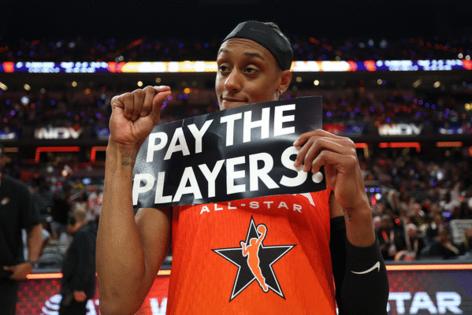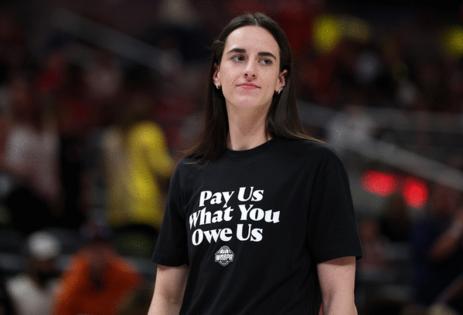Mac Engel: Why everyone should support WNBA players' bid to get more money
Published in Basketball
FORT WORTH, Texas — The WNBA players may be catty and petty, and full of themselves, but they are justified in their complaints about their salaries, a stance that has unified their audience against them.
If you hate these players for their blunt force tact to publicly complain about their pay, look in the mirror. You would be doing the same thing. You are more than likely doing the same thing right now. Or have done it at some point.
Because you know it’s there. Because you know that is the only way. Because this is the American way.
Because, in the words of the late Detroit Pistons Hall of Fame coach Chuck Daly, “It’s not about what you’re worth; it’s about what you can get.”
Forget the 10th amendment, that should be in the Bill of Rights.
Prominent WNBA players, such as Angel Reese and Kelsey Plum, have gone public with their complaints over the pay scale. During the WNBA’s recent All-Star weekend, the players wore T-shirts that read, “Pay Us What You Owe Us.”
It was tone deaf. It’s a bad look. The whining over shadowed All-Star weekend. And, do it anyways.
Ever since Ty Cobb hit a baseball for the Detroit Tigers have pro athletes in this country complained about their rights, up to and including the right to define league-related revenues. It’s what the NFL players went on strike for, in 1982, which resulted in the cancellation of seven regular-season games.
The WNBA players and the league are barreling towards a nasty collective bargaining session after this season that will dramatically change the pay scale for the players. This will be the first time in the league’s history where the players are expected to push, as opposed to saying, “Thank you, sir, may I have another?”
The WNBA players want a raise, and that starts with the league-generated revenue.
Similar labor history
What the WNBA players are doing is no different than what the likes of Cobb, Curt Flood or any other player from MLB, NHL and NFL have done for decades. The WNBA players are fighting for more. Because if you don’t speak up and fight for more, those that have it are not apt to share it.
Having reported on and covered multiple pro sports labor negotiations, here is what I have learned: Always be on the side of the players. The league makes more money than it knows what to do with, and will lie about everything.
What these players are learning now is what their male counterparts dealt with for generations. In the court of public opinion, they can’t win. No one wants to hear about it, because “you play sports for a living; you’re all overpaid.”
It’s a true statement, no different than the actor who is paid $20 million to star in a movie that bombs. Or, the CEO who cashes in when they’re fired because they’re terrible at their job.
When Yahoo CEO Marissa Mayer “resigned,” she received a $23 million severance package. When Fox News fired chief Roger Ailes, he received $40 million, even though he was canned because of a series of sexual misconduct allegations.
The irony here that is always lost on the general sports fan is that they have far more in common with Reese, Plum or any other pro athlete than they do their employer.
You show me the employee who isn’t asking for more, I’ll show you an employee who will never receive a raise.
Whether it’s the WNBA, NHL, MLB or NBA, all major pro sports team owners will claim they are losing millions running a team. Some basic accounting and clever use of an expense sheet can make anything look like a loss.
Shout out to the NFL owners who wisely stopped with these lame lies years ago.
Thank David Stern
It is widely assumed the NBA loses millions funding the WNBA, and that no team has actually turned a profit yet. Since the NBA is a private company, the financials aren’t public, so only the league knows the specifics.
The WNBA, which began in 1997, was a long-range ambition and investment led by former commissioner David Stern. Without the NBA, The W would have folded after its second or third year.
The WNBA is effectively a write off under the NBA’s marketing budget, similar to the NBA’s G League.
It’s also assumed that for the first time the league is starting to see pluses on the horizon; the league is adding teams, and there are now real local broadcast right contracts in some markets.
There is a reason why people are dumping money into the WNBA; league personnel are projecting that some teams will be in the black next season, as opposed to the Red Sea they have all been swimming in for decades.
We are not talking about NFL, MLB, NHL, NASCAR or major college football sized revenues here. This is all relative.
The WNBA is effectively nearing the end of the first quarter of its four quarter game, and the players want their cut.
The only way to get it is to ask for it.
You’d do the same.
©2025 Fort Worth Star-Telegram. Visit star-telegram.com. Distributed by Tribune Content Agency, LLC.










Comments